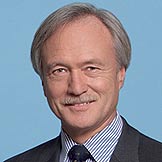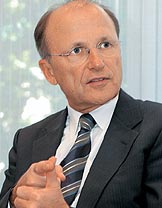Allianz SE, one of Europe's largest financial services providers, estimates that the environmental technology industry will create 700,000 new jobs in Germany between now and 2030. "In the second half of the 20th century, the automotive industry was German's most powerful driver of jobs, but in the coming decades, the environmental technology industry could take over that role. That opens up huge opportunities for Germany," said Joachim Faber, Member of the Board of Management Allianz SE and CEO of Allianz Global Investors, on Tuesday in Berlin. In the renewable energy industry alone, the number of jobs could double to 330,000 by 2030.
According to estimates by economists at Allianz and Dresdner Bank, in Germany alone the volume of the market for environmental technology will increase from 60 billion euros in 2006 to 400 billion euros in 2030, continued Faber. This is based on the assumption that both the integrated climate change and energy strategy endorsed by the 27 EU member states and the German government's eight-point plan for reducing carbon dioxide emissions will be implemented.
Allianz: Environmental technology will bring 700,000 new jobs
Download (in German only)

Nuclear power a transition technology
However, the industrial sector needs a reliable basis now on which to base its future investment decisions. In the words of Otto Steinmetz, Dresdner Bank Board Member and Head of Allianz Climate Core Group, nuclear power and the geological carbon capture and storage technique known as "clean coal" are important transition technologies.
"Renewable energy sources are the way forward. Nuclear power stations are not a long-term solution, they are a transition technology," said Steinmetz. This is why energy providers should be given an incentive to reduce their carbon dioxide emissions, he continued.
He believes that the European Emissions Trading Scheme is such an incentive, issuing only a limited number of tradable emissions certificates and thus encouraging companies to explore ways of becoming more efficient. Steinmetz also welcomed the German government's plan to auction a proportion of the emissions certificates in the future.

High expectations of G8 summit
Faber und Steinmetz also think that the European carbon dioxide emissions trading system should be extended to the rest of the world. They believe that such a system must involve more industrialized countries as well as developing countries to ensure that European industry is not at a competitive disadvantage.
Both managers are have high hopes that the G8 summit beginning on 6 June in Heiligendamm, Germany will lay the foundations of a climate agreement for the period beyond 2012, when the Kyoto Protocol expires. This new agreement should oblige signatory states to halve global carbon dioxide emissions from 1990 levels by 2050 and to create the incentives necessary to achieve this goal. "The politicians should not betray the trust the markets have placed in them," intoned Faber and Steinmetz at a joint press conference.
Creation of "Allianz Climate Solutions"
The issue of climate change has been a top priority for the Allianz Group for several years now. It has been highly active in this field, for example issuing joint publications with the WWF, establishing the Allianz Climate Core Group 2005 and gradually implementing an 80-point climate action plan, which contains objectives such as constructing buildings that are more energy efficient as well as its own carbon dioxide reduction targets.
Most recently, in May 2007, the Allianz Executive Board decided to establich "Allianz Climate Solutions" as a 100 percent subsidiary of Allianz SE. Faber explained that, "As professional risk managers, we want to bundle our international know-how from the fields of insurance, banking and asset management in 'Allianz Climate Solutions' and offer customers tailor-made solutions based on green products and services."
As with all content published on this site, these statements are subject to our Forward Looking Statement disclaimer.
Link to the disclaimer